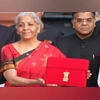Parliament session from January 31, FM to present Interim Budget on Feb 1
Union Minister Pralhad Joshi said that the Interim Budget session will commence with President Droupadi Murmu addressing both Houses of Parliament
)
Listen to This Article
Budget Session 2024: Union Parliamentary Affairs Minister Pralhad Joshi announced on Friday that the last session of the 17th Lok Sabha will be held from January 31 to February 9 and that Union Finance Minister Nirmala Sitharaman will present the Interim Budget on February 1.
Joshi further said that the Interim Budget session will commence with President Droupadi Murmu addressing both Houses of Parliament. The President addresses both the Rajya Sabha and the Lok Sabha at the beginning of the first session after each general election and at the beginning of the first session of each year.
The President's address typically highlights the government's past accomplishments as well as policy priorities for the next year, offering a broad framework for the government's agenda.
Also Read: Centre may peg FY25 fiscal deficit at 5.3% in interim budget: Goldman Sachs
Also Read: Centre may peg FY25 fiscal deficit at 5.3% in interim budget: Goldman Sachs
"#InterimBudgetSession2024, last session of seventeenth Lok Sabha to be held from January 31 to February 9, with address of Hon'ble President to the Parliament. On February 1, Hon'ble FM @nsitharaman ji will present the Interim Union Budget," the union minister wrote on X (formerly Twitter).
Also Read
#InterimBudgetSession2024, last session of Seventeenth Lok Sabha to be held from 31st January to 9th February, with address of Hon'ble President to the Parliament. On 1st February, Hon'ble FM @nsitharaman ji will present the Interim Union Budget. pic.twitter.com/fF0yzblsgU
— Pralhad Joshi (@JoshiPralhad) January 12, 2024
The session will be watched closely not just for the fiscal policies proposed, but also for the political posturing as parties prepare for the upcoming Lok Sabha elections.
All you need to know about Interim Budget
An Interim Budget is a temporary financial plan presented by the government when general elections are looming, or a new government is set to take office. It serves as a provisional arrangement to meet the expenditure needs of the government for a short period until a new government can formulate and present a full-fledged budget.
A Union Budget is valid till the end of the fiscal year on March 31, hence the government has speeding rights only till that date. For the government expenditure occurring between March 1 until a new government is formed, the incumbent government needs permission from the Parliament to incur costs in the interim period. As a result, the Interim Budget is released.
The Interim Budget normally comprises estimates of expenditure, revenue, fiscal deficit, financial performance, and projections for the upcoming financial year of the incumbent government. It cannot, however, incorporate any substantial policy announcements.
An Interim Budget, according to the Election Commission's code of conduct, cannot include any major schemes that may influence voters. The incumbent government is not supposed to present the Economic Survey with the Interim Budget.
More From This Section
Don't miss the most important news and views of the day. Get them on our Telegram channel
First Published: Jan 12 2024 | 1:58 PM IST
